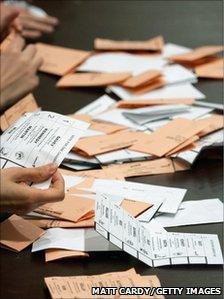Vote 2011: Guide to Welsh assembly election system
- Published

Voters get two papers in an assembly election
The voting system for the Welsh assembly is different to that for electing MPs and local councillors. BBC Wales political reporter Daniel Davies explains how it will work in the election on 5 May.
There are two votes taking place in Wales on 5 May - the election to the assembly and the referendum on changing the voting system for Westminster general elections.
But voters will have three ballot papers. That's because you can vote twice in an assembly election.
The system is known as the additional member system.
Voters get two ballot papers - one to elect the 40 constituency AMs and another to elect four AMs from each of the five electoral regions.
These 20 additional members are supposed to make sure that representation for each region matches the share of the votes cast for each party as closely as possible.
There are 40 constituencies, each with its own AM. Under the traditional first-past-the-post system, the candidate with the most votes wins. If there is a tie then a candidate is chosen by drawing lots.
Quota system
Wales is split into five electoral regions: south west, south central, south east, mid and west, and the north. Each has four regional AMs.
Seats are awarded using a quota system. The number of regional votes received by a party or independent candidate is divided by the number of constituency seats gained, plus one.
So if a party has one constituency seat in mid and west Wales, for example, the number of regional votes it receives is divided by two. If it has two constituencies, its regional vote is divided by three.
It may sound complicated, but it means the more constituencies a party wins, the more difficult it is to gain regional seats.
The intention is to make the final allocation more proportional to the number of votes received.
The regional seats each political party wins are filled by the candidates in the order they appear on the ballot paper, sometimes called the party's regional list. An independent candidate is treated as though he or she were a party with only one name on its list.